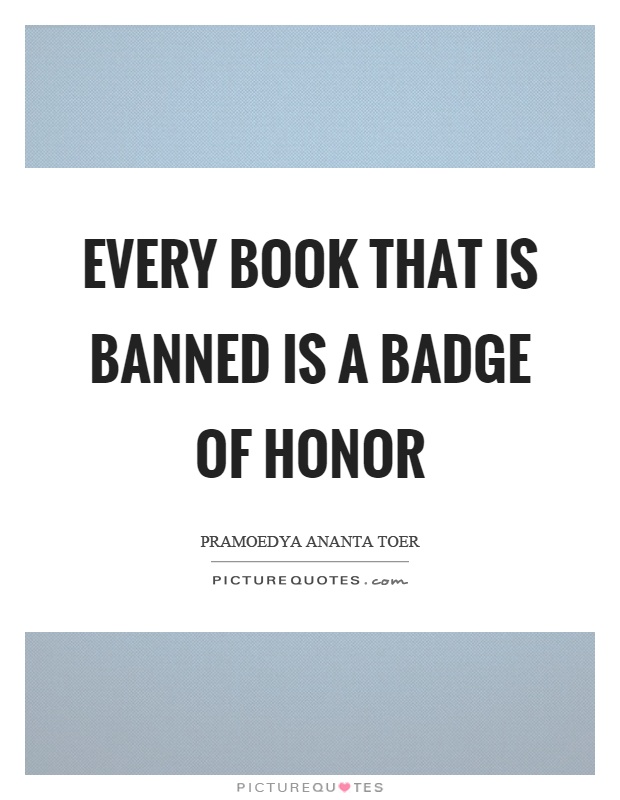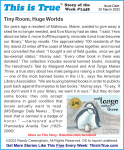This has also been published as a guest post on This Is True.

Every Sunday morning, I spend time writing for This is True, the oldest entertainment email publication on the Internet. It’s a highlight of my week as I get to digest interesting and unusual news stories down to 100-200 words, then give it a slug at the top and a creative tagline at the end. These stories may make you laugh, cry, get angry, or experience a variety of other (or no) emotions — but they will always make you think.
This week, one of the articles I covered was about the Matinicus Island Library, and how this tiny library in a tiny community is bringing banned books to its residents — because they want to read them. (Shameless self plug: If you subscribe to This is True this week — free or premium version — you’ll see my article. Or you can see an image of it at the bottom of this post.)
Books in their inventory include:
- “Catch-22” by Joseph Heller
- “To Kill a Mockingbird” by Harper Lee
- “The Handmaid’s Tale” by Margaret Atwood
- “The Grapes of Wrath” by John Steinbeck
- “The Bluest Eye” by Toni Morrison
- “And Tango Makes Three” published in 2005, “tells the true story of two male penguins at Central Park Zoo in New York City who raised a chick together. It is one of the most banned books in the country, according to the American Library Association.”
The article was inspiring. I’ve never understood the purpose of banning books. Even if you believe the contents of the book are horrible, hiding their contents from view is dangerous: if you don’t understand the positions you are against, how can you fully understand your own position? I also get very suspicious of people or groups who refuse to allow any criticism of their own beliefs or positions because if a statement is true, it will stand up to scrutiny.
I loved that this community is doing this amazing thing, all with the goal to give the islanders access to what they want to read. In the article, they were also very explicit about the kind of books the library wouldn’t accept.
They didn’t want their library to be overrun with musty, dog-eared, hand-me-down books that someone else just wanted to offload. They wanted books in good condition that islanders would want to read.
Enter “Big Media”
So, while researching the article, I happened to click on the link to the library, which took me to their Facebook page. I was surprised at the latest post there.
It has been brought to our attention that the recent Bangor Daily News piece about our library has been picked up by the Associated Press, which resulted in a story in U.S. News and other news outlets slanting us as the “Island of Misfit Toys” and suggesting that we wanted other libraries’ cast-offs. PLEASE–we’re BEGGING you–do NOT ship us your cast-aways! We have very little space and are NOT trying to “bulk up” our collection!
I checked the U.S. News article, and sure enough, there it was right in the subtitle and lede:

“There’s an ‘Island of Misfit Toys’ in the popular Christmas show.”
“There’s an ‘Island of Misfit Toys’ in the popular holiday classic. Now there’s an island for unwanted and banned books, too.”
“The tiny library on Matinicus Island 22 miles (35 kilometers) off the Maine coast is on a mission to fill its shelves with books that have fallen out of favor elsewhere.”
The rest of the article, which is directly from Associated Press, does seem to accurately describe what the library is actually doing, but people usually don’t read that far, and anyone just looking at the preview on a social media feed or scanning the top of the article will just see what U.S. News put at the top. And they made it worse with their subtitle.
Think About What You Read
This is why it’s important to think about whatever you’re reading and check multiple sources, especially original sources if possible. One thing that I’ve loved about working with True is that Randy Cassingham enforces working from the original source whenever we can, which often leads to finding out the original information instead of what’s presented in the global “telephone game” where media and bloggers copy copies of copies into their own articles.

Every article on the internet (including this one) has a slant, theme, and intent, which is why it’s important to read varying points of view and expand your knowledge by reading as much as you possibly can.
Which is kind of why that little library is doing what it’s doing.

Leave a comment